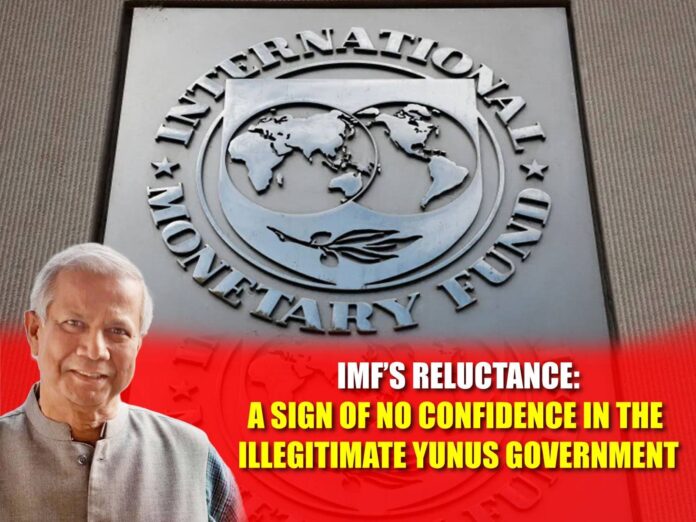The news coming out of Washington, D.C. is not at all surprising. The International Monetary Fund (IMF) has made it clear that until an elected government takes power, no further loan installments will be released. This decision carries a powerful message. The global community now understands that the government which seized power through the bloody riots of July cannot be trusted with public money.
When Muhammad Yunus and his so-called advisory council took the throne under the protection of the military, they perhaps thought that international donor agencies would grant them legitimacy. But the reality has turned out to be quite the opposite. The IMF’s decision proves that no matter how well-planned a foreign-funded coup may be, it has no acceptance on the world stage.
There was talk of a $4.7 billion loan agreement, later increased by another $800 million. Yet out of the total $5.5 billion, only $3.6 billion has been disbursed. Why is the rest frozen? The reason is clear: the IMF has no confidence in this so-called interim government, which is essentially an illegal administration. And there are solid reasons behind this lack of trust.
Over the past few months, the country’s economy has hit rock bottom. It’s evident that this government has no plan. Foreign reserves are steadily shrinking, inflation is skyrocketing, and ordinary people are struggling to afford daily necessities. Yet the government seems unconcerned. Its only focus is on clinging to power and siphoning off public money for personal gain.
The IMF now has strong evidence that any funds given to this government would not be used for public welfare. Instead, new channels of corruption and money laundering would be created. That’s why the IMF has clearly stated that no more money will be released until an elected government takes office. This is not just an administrative decision—it’s an unmistakable expression of the international community’s distrust of an illegitimate regime.
The riots in July were not a spontaneous people’s movement. That bloody episode was orchestrated with foreign funding and the active involvement of Islamist militant groups. The coup succeeded only because a faction of the military supported it. But other nations have not turned a blind eye. They know very well who the masterminds were and whose interests were being served.
Muhammad Yunus may be a Nobel laureate, but that doesn’t make him a democratic leader. The man who charged high interest rates from poor people for decades in the name of microcredit cannot be expected to work for public welfare. Neither he nor his council members were elected by the people or came to power through any democratic process—so how can anyone expect accountability from them?
According to statements made by the Bangladesh Bank governor after returning from Washington, discussions with the IMF did not go well. Uncertainty now looms over the disbursement of the remaining funds. This means that international institutions have realized that giving money to this government would guarantee misuse. They are no longer willing to take that risk.
Interestingly, those who installed this government probably assumed that Western countries would be pleased. But in reality, while diplomats may pretend to show support in public statements, when it comes to money, they are far more cautious. The IMF is not a political body—it looks at the numbers. And the numbers show that loans given to this government are unlikely to be repaid or used for development.
There are many similar examples around the world where international aid was cut off after illegitimate regimes took power—Myanmar, Egypt, and Thailand, to name a few. After any military coup or undemocratic power grab, the international community’s first response is economic pressure. The same is now happening in Bangladesh. The IMF’s decision signals that the global community is unwilling to accept this illegitimate government.
Another important point: when the IMF lends money to a country, it doesn’t simply walk away—it monitors how the money is spent. Given the explosion of corruption and lack of transparency under this government, the IMF could not remain silent. They may have realized that the government would be unable to provide any credible accounting, so they took precautionary action.
This situation is extremely concerning for the country. Reserves are falling, foreign currency shortages are deepening, and now the IMF loan is frozen. The consequences will be felt by ordinary citizens—further depreciation of the taka, higher import costs, and skyrocketing prices of essentials. But those in power seem unconcerned. Their priorities are filling their own pockets and hiding their wealth abroad.
It’s likely that the IMF has obtained intelligence showing irregularities in the government’s financial dealings—perhaps evidence of money laundering or corruption. Otherwise, they would not have stated so bluntly that no more funds would be disbursed before an elected government takes power. This is a huge humiliation and a clear expression of distrust.
The people of Bangladesh now face a harsh reality: economic crisis on one side, political turmoil on the other, and in the middle, an illegitimate government with no accountability. The IMF’s decision may be a major blow to this government, but in the long term, it could be a positive step for the country. At least the international community has now sent a clear message that it will not conduct business as usual with undemocratic regimes.
There is only one way out of this situation: to hold a free and fair election as soon as possible. Only when a government elected by the people takes office will international confidence be restored, foreign aid resume, and the economy have a chance to stabilize. But as long as this illegitimate government remains in power, Bangladesh will continue moving toward international isolation.





